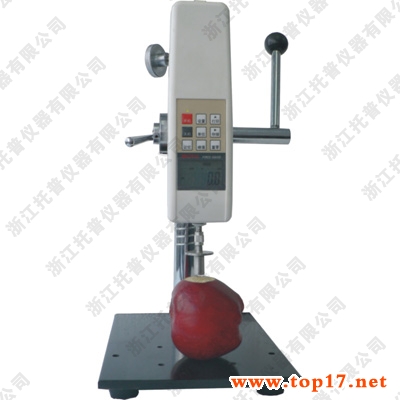Fruit hardness tester is also called fruit hardness tester. It is a professional instrument for measuring the hardness of apples, pears, watermelons, bananas and many other fruits. The instrument is small in size, light in weight, intuitive in numerical value, easy to carry, and very suitable for various applications. The test of fruit products in fruit establishments was deeply loved by fruit tree research departments, fruit tree farms, fruit companies, universities, and other institutions. It played an important role in actual measurement work. There are four types of fruit hardness tester: GY-1, GY-2, GY-3, and GY-4. The models are different, and they have different functions. The price is different, so here's a brief introduction to the four types. What is the difference between the model fruit hardness tester?

The most obvious difference between GY-1, GY-2, and GY-3 is that the GY-1 type fruit hardness tester is generally used to measure harder fruits such as apples and pears. The GY-2 fruit hardness tester is used to measure soft fruits such as grass plum, while the GY-3 fruit hardness tester is both hard and soft measurable, and it can be said to have both GY-1 and GY-2 functions. In addition, the main difference between the GY-4 type fruit hardness tester and the other three kinds of fruit hardness testers is in terms of function development. GY-4 is not only compatible with the measurement of the hardness of various GY-1, GY-2, GY-3 fruits, but also The digital display has a data storage function, a data output function, and an automatic peak function, and is a fruit hardness tester model with a relatively high degree of intelligence.
Although these four types of fruit hardness testers differ in function, they all have characteristics such as high measurement accuracy, small size, and portability when measuring fruit firmness. Therefore, when selecting a user, the user is mainly based on their own needs. You can choose the right model, and you don't need to pay extra for the pursuit of functional satisfaction. If you have questions about the differences between the four types of fruit hardness tester, you can also click on the link: http:// to view this separately. Details of four types of fruit hardness tester.
Aluminum Alloy Fuel Tank Semi-trailer
The requirements for tank material of chemical liquid transportation semi-trailer are different according to the characteristics of the transported medium. Commonly used chemical liquid can tank materials are: stainless steel (202, 304, 316L) carbon steel, plastic steel (lined plastic tank), glass steel, aluminum cans, plastic cans (polyethylene, polypropylene) and so on. The whole plastic tank series selects polyethylene as the main raw material formulation process, the whole forming plastic and plastic products at the same time, has no seams, no leakage, corrosion resistance, anti-aging, impact resistance, non-toxic, It is suitable for storage, transportation, reaction, stirring, wastewater and gas treatment of most acids, alkalis, salts, alcohols and aldehydes. Aluminum tank is the best choice for transporting liquid nitric acid.
Aluminum Alloy Fuel Tank Semi-Trailer,Mirror Aluminum Fuel Tanker Trailer,Aluminum Fuel Tank Trailer,Aluminum Fuel Tanker Semi Trailer
Shandong Chengda Auto Sales Co., Ltd. , https://www.chengdasemitrailer.com